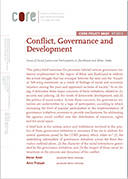This policy brief examines the premises behind various governance initiatives implemented in the region of Bihar and Jharkhand to address the armed struggle that has emerged between the state and the ‘Naxals’ or ‘left-wing extremists’ as a result of feelings of social and economic injustice among the poor and oppressed sections of society. In so doing, it delineates three major concerns of these initiatives, related to: (1) security and policing, (2) the needs of democratic development, and (3) the politics of social justice. Across these concerns, the governance initiatives are underwritten by a logic of participation, according to which increasing the level of popular participation in the implementation of governance initiatives promises to provide mechanisms for addressing the agrarian social conflict over fair distribution of resources, rights and the social space.
A brief look at the various actors and institutions involved in the practice of these governance initiatives is necessary if we are to address the central questions posed by the CORE project, which relate to: (1) the underlying rationalities of governance initiatives across the three thematics outlined above, (2) the character of the social interactions generated by the governance initiatives, and (3) the impact of those social interactions on the process and dynamics of the conflict.







